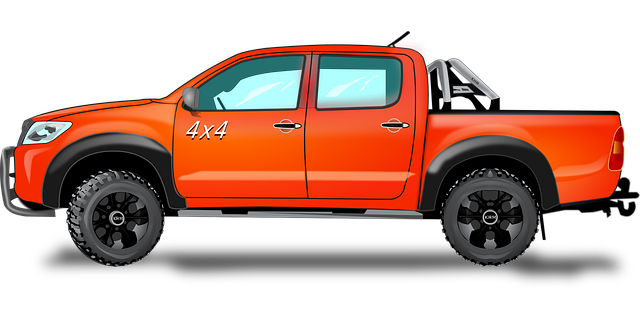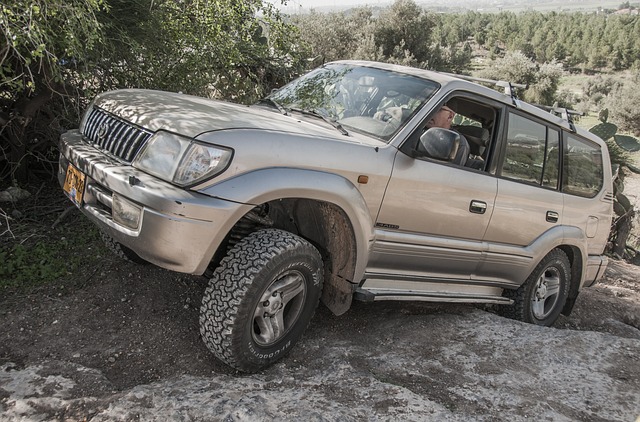Receiver hitches are crucial for 4×4 vehicles, offering secure towing and hauling solutions with various accessories. Regular maintenance is essential to prevent failures and damage, especially to pins, latches, and corrosion. This guide provides a comprehensive RGV-4×4-repair process, from diagnosing issues to reattaching a new hitch after safe removal and inspection of the frame. Choosing the right hitch type aligns with vehicle specs and towing needs, while regular maintenance extends the lifespan of receiver hitches for safer off-road adventures.
“Unleash the power of versatility with receiver hitches—the ultimate accessory for tow and carry. This comprehensive guide delves into the intricacies of RGV-4×4 receiver hitches, exploring common issues and offering a step-by-step repair manual for DIY enthusiasts.
Learn to identify and resolve problems, ensuring your vehicle’s safety and optimal performance. Discover the art of choosing the perfect replacement hitch and master maintenance tips to extend its lifespan. For all things RGV-4×4-repair, this article is your trusted companion.”
- Understanding Receiver Hitches: A Basic Overview
- Common Issues with RGV-4×4 Receiver Hitches
- Steps for RGV-4×4 Repair: A Comprehensive Guide
- Choosing the Right Replacement Hitch for Your Vehicle
- Maintenance Tips to Extend the Lifespan of Your Receiver Hitch
Understanding Receiver Hitches: A Basic Overview

Receiver hitches are an essential component for any off-road or 4×4 vehicle, offering a secure and versatile way to tow trailers, haul cargo, or attach various accessories. These hitches are designed to connect to the receiver box on your vehicle, providing a sturdy mounting point for a wide range of applications. Understanding how they work is crucial for anyone considering an RGV-4×4-repair or seeking to enhance their vehicle’s capabilities.
The basic structure consists of a metal hitch ball that protrudes from the receiver box, typically rated for specific weight capacities. This ball interlocks with a coupler, which can be quickly attached and detached, allowing for easy loading and unloading. The versatility comes from the wide array of accessories available, such as goosenecks, camera systems, or winches, each serving unique purposes like increased towing stability, enhanced visibility, or added functionality during off-road adventures.
Common Issues with RGV-4×4 Receiver Hitches

Receiver hitches, like RGV-4×4 models, are essential for towing and carrying heavy loads, but they’re not immune to issues. One common problem is the pin or latch mechanism failure, which can make it difficult to secure a trailer or load. This often requires immediate rgv-4×4-repair to prevent accidents during driving. Corrosion is another frequent culprit, especially in regions with high moisture levels, leading to rust and weakened connections.
Additionally, misalignment of the hitch can cause improper towing, resulting in unstable loads and potential damage to both the vehicle and trailer. Regular maintenance and inspection are crucial to identify these issues early on, ensuring safe towing practices.
Steps for RGV-4×4 Repair: A Comprehensive Guide

To tackle a RGV-4×4 repair, follow these meticulous steps for a successful outcome. First, assess the issue at hand – is it a worn-out hitch or a loose connection? This determination guides your process. Next, gather the necessary tools and parts, ensuring compatibility with your specific RGV-4×4 model. Safety is paramount; wear protective gear and ensure a level work surface.
Demolition begins by carefully removing the existing hitch system, taking note of each component for easy reassembly. Inspect the frame and surrounding areas for damage or corrosion, addressing these issues before proceeding. With the old parts replaced, meticulously reattach the new hitch, securing it tightly according to manufacturer guidelines. Test the repair by safely towing a load to verify functionality and durability.
Choosing the Right Replacement Hitch for Your Vehicle

When it comes to replacing your vehicle’s hitch, selecting the suitable option is paramount for a seamless experience during RV and 4×4 repairs (RGV-4×4-repair). Different vehicles have unique hitch requirements, so understanding your car’s specifications is crucial. The most common types include class I, II, and III hitches, each with varying weight capacities and mount styles. For instance, a class I hitch is ideal for lighter trailers, while heavier ones require higher-rated options like class III.
Additionally, consider the type of towing you’ll be doing. If off-road adventures are on your radar, a robust hitch designed for rugged terrain might be necessary. Modern hitches often come with additional features like electrical connectors for trailer lighting and safety sensors, enhancing both convenience and safety during your travels.
Maintenance Tips to Extend the Lifespan of Your Receiver Hitch

Extending the lifespan of your receiver hitch is crucial for seamless 4×4 repairs and modifications. Regular maintenance plays a vital role in ensuring its longevity and performance. Start by inspecting the hitch for any signs of wear or damage, particularly at the mount points and safety chains. Addressing minor issues early on can prevent more significant problems down the line.
Keep the hitch clean and lubricated to facilitate smooth operation and protect against corrosion. Use a suitable lubricant designed for automotive applications and apply it sparingly to moving parts. Additionally, regularly check the integrity of all bolts and fasteners securing the hitch system, torquing them as per the manufacturer’s specifications. This simple yet effective practice prevents loose connections that can compromise safety during off-road adventures.
In conclusion, receiver hitches play a vital role in enhancing your vehicle’s towing capacity and versatility. By understanding the basics, identifying common issues like those often encountered with RGV-4×4 receiver hitches, and following comprehensive repair guides (such as our detailed RGV-4×4 repair steps), you can ensure optimal performance. Choosing the right replacement hitch tailored to your vehicle and implementing effective maintenance tips will extend its lifespan, making it a reliable companion for all your towing needs.



